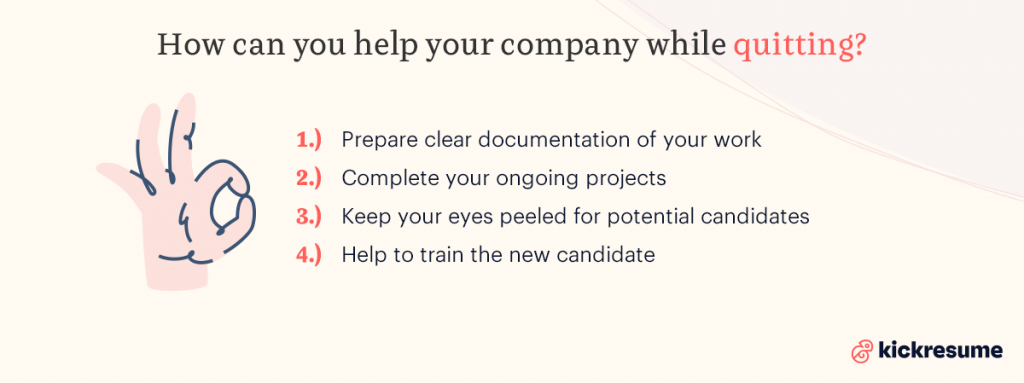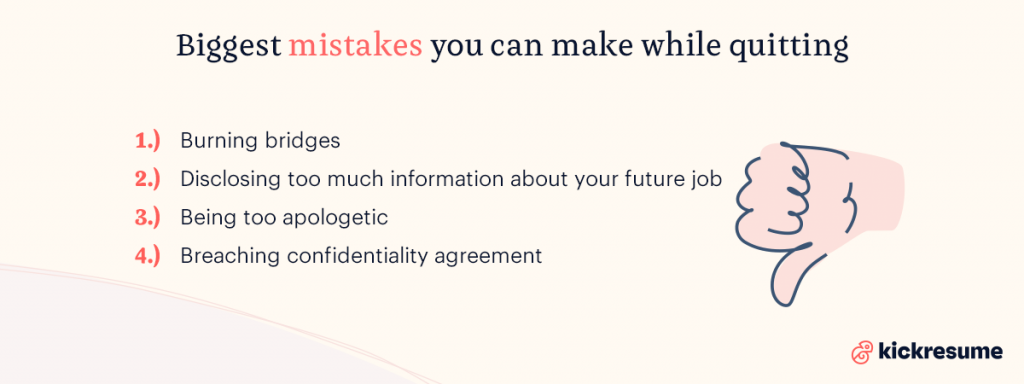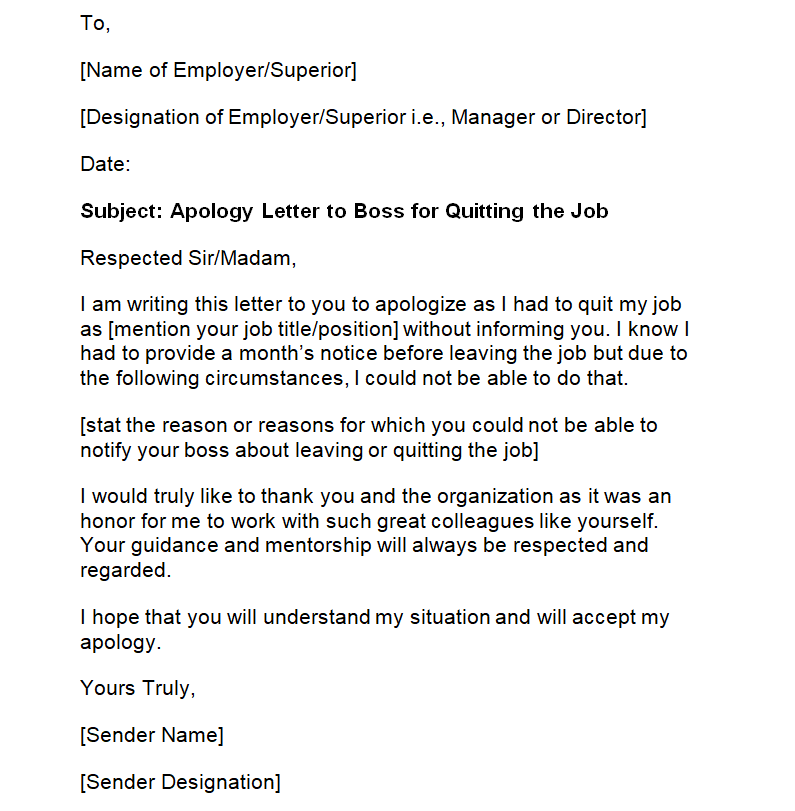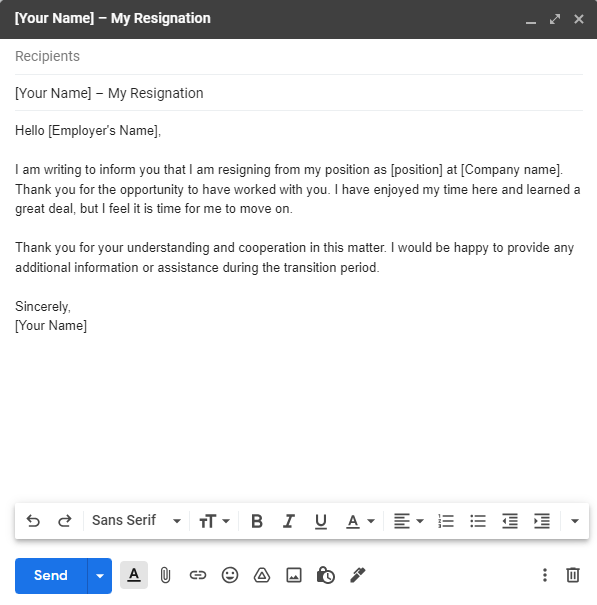How To Tell Your New Boss You're Quitting

The ink on your offer letter is barely dry, the onboarding process still fresh in your mind, and yet, the undeniable truth looms: you need to tell your new boss you're quitting. It’s a scenario many dread, a delicate dance between professionalism and personal circumstances that can significantly impact your career trajectory. Navigating this situation requires careful planning and execution to minimize disruption and maintain positive relationships.
This article delves into the crucial steps involved in informing your new manager that you are resigning shortly after accepting a position. The goal is to provide a comprehensive guide to handling this challenging situation with grace, integrity, and strategic foresight. It offers practical advice on timing, communication, and potential outcomes, ensuring you leave on the best possible terms.
Timing is Everything: When to Deliver the News
The timing of your resignation announcement is critical. Experts generally advise informing your manager as soon as you've made a firm decision, ideally in person. Delaying the conversation only prolongs the awkwardness and could negatively impact ongoing projects and team dynamics.
Consider the stage of your onboarding process. According to a 2023 survey by the Society for Human Resource Management (SHRM), offering a resignation within the first week can be viewed differently than after several weeks of training and investment. The sooner you communicate, the less disruptive it is likely to be.
Crafting the Message: Honesty and Diplomacy
Transparency, balanced with tact, is paramount when delivering your resignation. Prepare a concise explanation, focusing on your personal circumstances or the compelling reasons driving your decision. Avoid overly detailed or negative critiques of the company or position.
“A simple, 'I appreciate the opportunity, but I've realized this role isn't the right fit for me at this time,' can be sufficient," advises career coach Jane Miller. "Emphasize your gratitude for the opportunity and express regret for any inconvenience caused."
Be prepared to answer questions, but avoid getting drawn into lengthy debates or providing excessive justification. Maintain a professional demeanor and remain firm in your decision.
The Face-to-Face Conversation: A Matter of Professionalism
While email may seem like an easier option, a face-to-face conversation is generally considered the most professional approach. Schedule a private meeting with your manager to deliver the news. This allows for a more personal and understanding exchange.
Start by expressing your gratitude for the opportunity and your appreciation for their time. Clearly and concisely state your intention to resign. Offer a brief explanation without oversharing personal details.
Remember to actively listen to your manager's response and remain calm and respectful, regardless of their reaction. Avoid defensiveness or arguing your points. Your goal is to maintain a positive relationship and leave on good terms.
The Resignation Letter: Formalizing Your Departure
Following your verbal resignation, provide a formal written notice. This document serves as an official record of your departure and protects both you and the company. Keep the letter concise and professional, reiterating your resignation date and expressing gratitude.
Include essential information such as your last day of employment and a brief statement acknowledging your commitment to a smooth transition. According to legal firm Smith & Jones, a well-crafted resignation letter can mitigate potential legal issues and protect your reputation.
Keep a copy of the resignation letter for your records. This documentation may be necessary for future employment verification or references.
Offering Assistance: Facilitating a Smooth Transition
Demonstrate your commitment to professionalism by offering to assist with the transition process. This could include documenting your work, training a replacement, or completing urgent tasks.
While your obligation is limited, a willingness to help can leave a positive impression. This shows respect for your colleagues and the company's goals, even as you depart.
However, be realistic about your capacity and availability. Don't overcommit or promise more than you can deliver during your remaining time.
Navigating Potential Outcomes: Preparing for the Unexpected
Be prepared for a range of reactions from your manager and colleagues. Some may be understanding and supportive, while others may express disappointment or even anger.
Maintain a professional and respectful demeanor regardless of the response. Avoid engaging in arguments or defending your decision. Remember that you have made a choice that is right for you.
In some cases, the company may ask you to leave immediately. Be prepared to comply with their decision and gather your belongings promptly and respectfully.
Looking Ahead: Maintaining Your Professional Network
Leaving a new job shortly after starting can be challenging, but it's crucial to focus on maintaining your professional network. Express your gratitude to your colleagues and manager for the opportunity and the time they invested in you.
Stay in touch with colleagues who have been supportive. Maintaining these connections can be valuable for future career opportunities. Even though this role wasn't right for you, you never know where these relationships might lead.
Ultimately, handling your resignation with grace and professionalism will minimize any negative impact on your career and preserve your reputation. It is a testament to your integrity and demonstrates your commitment to ethical conduct, even in difficult circumstances.



:max_bytes(150000):strip_icc()/how-to-tell-your-boss-you-re-quitting-your-job-2063035_FINAL-5b88037cc9e77c002cc6f46c.png)








:max_bytes(150000):strip_icc()/2060865a-a00dd037c25547df8a83c13bb57cd695.jpg)


:max_bytes(150000):strip_icc()/2063053_2022-f09cb56e07f643d79b31483a3e14f07b.jpg)


